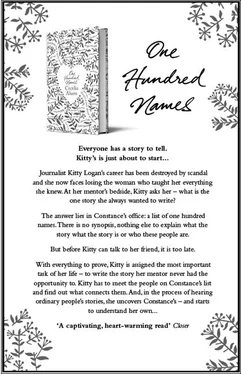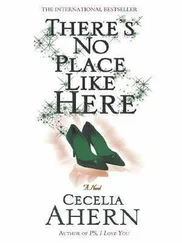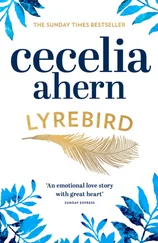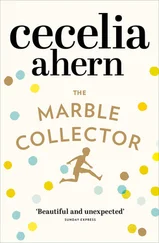‘Ruth,’ he closed his eyes, ready to jump off the balcony then and there if she was going to leave him, ‘please don’t leave me.’
‘Not me, Lou,’ she said. ‘I’m talking about them.’
He turned around and watched his family join a convoy, as the room danced around in a train, kicking their legs every few steps. ‘I’m racing with Quentin tomorrow. On the boat.’ He looked at her for praise.
‘I thought Gabe was doing that?’ Ruth asked in confusion. ‘Gabe offered his time to Quentin right here in front of me. Quentin said yes.’
Anger rose as Lou’s blood boiled. ‘No, I’m definitely going to do it.’ He would see to it.
‘Oh, really? Is that before or after you’re coming ice-skating with me and the kids?’ she asked, before walking off and leaving him alone on the balcony, cursing himself for forgetting his promise to Lucy.
As Ruth opened the door to the balcony, music rushed out and cold air rushed in. Then the door closed again, but he felt a presence behind him. She hadn’t gone inside. She hadn’t left him.
‘I’m sorry about everything I’ve ever done. I want to fix it all,’ he said with exhaustion. ‘I’m tired now. I want to fix it. I want everyone to know that I’m sorry. I’d do anything for them to know that and to believe me. Please help me fix it,’ he repeated.
Had Lou turned around then he would have seen that his wife had indeed left him; that she’d rushed off to a quiet place to once again cry her tears of frustration for a man who had convinced her only hours previously in their bedroom that he had changed. No, it was Gabe that had stepped in when Ruth had rushed off, and it was Gabe who heard Lou’s confessions on the balcony.
Gabe knew that Lou Suffern was exhausted. Lou had spent so many years moving so quickly through the minutes, hours and days, through the moments, that he’d stopped noticing life. The looks, gestures and emotions of other people had long since stopped being important or visible to him. Passion had driven him at first, and then, while on his way to the somewhere he wanted to be, he’d left it behind. He’d moved so fast, he’d taken no pause for breath; his rhythm was too quick, his heart could barely keep up.
As Lou breathed in the cold December air and lifted his face up to the sky, to feel – and appreciate – the icy droplets of rain that fell onto his skin, he knew that his soul was coming to get him.
He could feel it.
25. The Best Day
At nine a.m. on Saturday morning, the day after his father’s seventieth birthday party, Lou Suffern sat out in his back garden and lifted his face and closed his eyes to the morning sun. He’d clambered over the fence that separated their two-acre landscaped garden – where pathways and pebbles, garden beds and giant pots signposted the way to walk – from the rugged and wild terrain that lay beyond human meddling. Splashes of yellow gorse were everywhere, as though somebody in Dalkey had taken a paintball gun and fired carelessly in the direction of the northside headland. Lou and Ruth’s house sat at the very top of the summit, their back garden looking out to the north with vast views of Howth village below, the harbour, and out further again to Ireland’s Eye. Often, Snowdon in Snowdonia National Park in Wales, 138 kilometres away, could be seen from the headland; though on this clear day it was forever that Lou Suffern had his eye on.
Lou sat on a rock and breathed in the fresh air. His numb nose dribbled, his cheeks were frozen stiff, and his ears ached from the nip in the wind. His fingers had turned a purplish blue, as though they were being strangled at the knuckles; not good weather for vital parts, but ideal weather for sailing. Unlike the carefully maintained gardens of his and his neighbours’ houses, the wild and rugged gorse had been even more lovingly left to grow as it wanted, like a second child who was given more space and less rules. It had roamed the mountainside and stamped its authority firmly around the headland. The land was hilly and uneven, it rose and fell without warning, apologised for nothing and offered no assistance to trekkers. It was the student in the back row in class, quiet but suggestive, sitting back to view the traps it had laid. Despite Howth’s wild streak in the mountains and the hustle and bustle of a fishing village, the town itself always had a sense of calm. It had a patient, grandparental feel about it: lighthouses that guided inhabitants of the waters safely to shore; cliffs that stood like a line of impenetrable Spartans with heaving chests and muscles that rippled through abdomens, fierce against the elements. There was the pier that acted as a mediator between land and sea and dutifully ferried people out as far as humanly possible; the Martello tower that stood like a lone ageing soldier who refused to leave his zone long after the trouble had ended. Despite the constant gusts that attacked the headland, the town was steady and stubborn.
Lou wasn’t alone as he pondered his life. Beside him sat himself. They were dressed differently: one ready for sailing with his brother, the other for ice-skating with the family. They stared out to sea, both watching the shimmer of the sun on the horizon, looking like a giant silver dime had been dropped in for luck and now glimmered under the waves. They’d been sitting there for a while, not saying anything, merely comfortable with their own company.
Lou on the mossy grass looked at Lou on the rock and smiled. ‘You know how happy I am right now? I’m beside myself,’ he chuckled.
Lou, sitting on the rock, fought his smile. ‘The more I hear myself joke, the more I realise I’m not funny.’
‘Yeah, me too.’ Lou pulled a long strand of wild grass from the ground and rolled it around his purple fingers. ‘But I also notice what a handsome bastard I am.’
They both laughed.
‘You talk over people a lot, though,’ Lou on the rock said, recalling witnessing his other self commanding conversations unnecessarily.
‘I noticed that. I really should –’
‘And you don’t really listen,’ he added, deep in thought. ‘And your stories are always too long. People don’t seem to be as interested as you think,’ he admitted. ‘You don’t ask people about what they’re doing. You should start doing that.’
‘Speak for yourself,’ Lou on the grass said, unimpressed.
‘I am.’
They sat in silence again because Lou Suffern had recently learned that much ascended from silence and from being still. A gull swooped, squawked, eyed them suspiciously and then flew off.
‘He’s off to tell his mates about us,’ Lou on the rock said.
‘Let’s not take whatever they say to heart; they all look the same to me,’ the other Lou said.
They both laughed again.
‘I can’t believe I’m laughing at my own jokes.’ Lou on the grass rubbed his eyes. ‘Embarrassing.’
‘What’s going on here, do you think?’ Lou asked seriously, perched on his rock.
‘If you don’t know, I don’t know.’
‘Yes, but if I have theories, well then, so do you.’
They looked at one another, knowing exactly what the other was thinking.
Lou chose his words wisely, letting them roll around his mouth before saying, ‘I’m not superstitious, but I think we should keep those theories to ourselves, don’t you? It is what it is. Let’s keep it at that.’
‘I don’t want anybody to get hurt,’ Lou on the grass spoke up.
‘Did you just hear what I said?’ he said angrily. ‘I said don’t talk about it.’
‘Lou!’ Ruth was calling them from the garden and it broke the spell between them.
‘Coming!’ he yelled, peeping his head above the fence. He saw Pud, new to his feet, escaping to freedom through the kitchen door, racing around the grass unevenly like an egg that had prematurely hatched where legs alone had broken free. He shuffled along after the ball, trying to catch it but mistakenly kicking it with his running feet each time he got near. Finally learning, he stopped running before reaching the ball, and instead slowly sneaked up behind it as though it was going to take off again by itself. He lifted a foot. Not used to having to balance on one leg, he fell backwards onto the grass, landing safely on his padded behind. Lucy ran outside in her hat and scarf and helped to pull him up.
Читать дальше
Конец ознакомительного отрывка
Купить книгу












